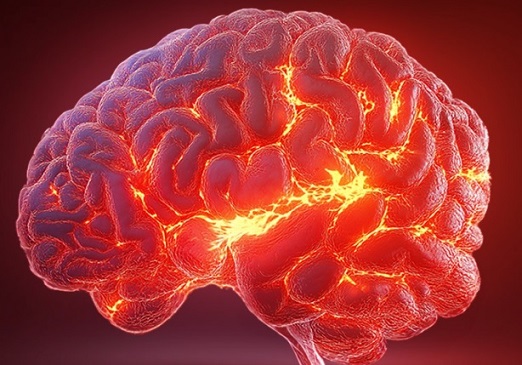Plant Based Compounds Offer Hope in Easing Brain Inflammation in Alzheimer’s Disease
Nikhil Prasad Fact checked by:Thailand Medical News Team May 12, 2025 9 months, 2 days, 19 minutes ago
Medical News: A groundbreaking review study conducted by researchers from the Department of Medical Biology and Biochemistry at Ludwik Rydygier Collegium Medicum in Bydgoszcz, part of Nicolaus Copernicus University in Toruń, Poland, reveals the promising role of naturally occurring compounds called flavonoids in reducing brain inflammation associated with Alzheimer’s disease (AD). The review explores how these plant-derived substances could be the foundation for future treatments aimed not just at relieving symptoms, but potentially slowing the disease itself.
 Plant Based Compounds Offer Hope in Easing Brain Inflammation in Alzheimer’s Disease
Plant Based Compounds Offer Hope in Easing Brain Inflammation in Alzheimer’s Disease
Alzheimer’s disease is the most common form of dementia, affecting nearly 50 million people worldwide—a number expected to triple by 2050. It is a progressive brain disorder characterized by memory loss, confusion, and a decline in thinking skills. The brain of a person with AD undergoes multiple damaging changes, including the buildup of toxic amyloid-β plaques and tau tangles, oxidative stress, and persistent inflammation. This
Medical News report focuses on how certain flavonoids might be able to protect the brain by targeting these processes.
Understanding the Link Between Inflammation and Alzheimer’s
At the heart of Alzheimer’s is neuroinflammation, a condition where immune cells in the brain, called microglia, remain constantly activated and release harmful substances like cytokines and reactive oxygen species (ROS). While these immune cells typically protect the brain, in AD, their overactivity actually accelerates brain damage.
This constant state of inflammation doesn’t just affect brain cells—it also makes it harder for the brain to clear the buildup of toxic amyloid-β plaques and contributes to the breakdown of neuron connections responsible for memory and learning. Inflammation also worsens oxidative stress, where damaging molecules known as free radicals harm brain cells, leading to their eventual death.
Flavonoids and Their Multitargeted Healing Potential
Flavonoids are compounds found in everyday foods like apples, onions, berries, green tea, cocoa, and citrus fruits. They are widely known for their antioxidant properties, but this study outlines how their role goes far beyond just neutralizing free radicals.
Key flavonoids studied include:
-
Quercetin, found in onions and apples, which reduces inflammation and boosts brain cell energy production
-
Luteolin, present in celery and parsley, which blocks inflammatory signaling and protects memory in animal models
-
Apigenin, from chamomile, which reduces the build-up of tau proteins linked to neuron death
These compounds can reduce brain inflammation by calming microglia, lowering cytokine levels, and even al
tering how harmful proteins like amyloid-β and tau behave in the brain. Some flavonoids were found to reduce the production of these toxic proteins and help the brain clear them more efficiently.
Evidence from Human and Animal Studies
In both animal models and early human trials, flavonoids have shown the ability to protect brain function. For example, in people with mild cognitive impairment (a condition that can precede Alzheimer’s), daily flavonoid-rich supplements improved memory, reduced mood issues, and boosted antioxidant defenses.
In Alzheimer’s mice, treatment with luteolin and quercetin improved cognition and reduced brain inflammation significantly. In some studies, combining flavonoids with standard Alzheimer’s drugs like donepezil led to even greater improvements than using the drug alone.
A Natural Path Forward with Some Challenges
Despite these promising findings, one of the biggest challenges is that flavonoids often have poor bioavailability—meaning our bodies don’t absorb them well when taken orally. However, researchers are now testing new delivery methods like nano-encapsulation to get more of these compounds into the brain.
Another limitation is that most studies have been short in duration. Scientists are calling for larger and longer human trials to better understand how flavonoids work over time and whether they can truly slow the progression of Alzheimer’s.
Conclusion
The study provides a hopeful outlook on using flavonoids as a natural and safe way to target multiple aspects of Alzheimer’s disease at once. From reducing inflammation and oxidative stress to improving memory and clearing toxic proteins, these compounds offer a multi-pronged approach that current medications alone cannot deliver. However, more research is urgently needed to determine optimal doses, delivery systems, and long-term safety in humans. If further validated, flavonoids may one day be a key part of personalized treatment strategies for Alzheimer’s disease.
The study findings were published in the peer reviewed journal: Brain Sciences
https://www.mdpi.com/2076-3425/15/5/485
For the latest on Alzheimer, keep on logging to Thailand
Medical News.
Read Also:
https://www.thailandmedical.news/news/phytochemicals-from-acanthopanax-senticosus-plant-found-to-block-brain-inflammation-and-cognitive-decline-in-alzheimer
https://www.thailandmedical.news/news/phytochemical-compound-from-certain-orchids-shows-promise-for-brain-health-and-alzheimer-s-disease
https://www.thailandmedical.news/news/total-saikosaponins-from-the-root-of-the-radix-bupleuri-plant-can-help-in-treatments-for-alzheimer-s-disease
https://www.thailandmedical.news/articles/alzheimer,-dementia-
https://www.thailandmedical.news/articles/herbs-and-phytochemicals
https://www.thailandmedical.news/pages/thailand_doctors_listings
